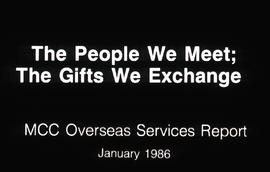Bereich "Identifikation"
Signatur
Titel
Datum/Laufzeit
- 1986 (Anlage)
- 1971-1986 (Anlage)
Erschließungsstufe
Sammlung
Umfang und Medium
140 slides : col. ; 5 x 5 cm
Bereich "Kontext"
Name des Bestandsbildners
Verwaltungsgeschichte
MCC Canada is a peace, relief, and service agency of Canadian Mennonites and Brethren in Christ. It was founded in December of 1963 through the merger of seven regional Mennonite and Brethren in Christ service organizations: the Non-Resistant Relief Organization (NRRO), the Canadian Mennonite Relief Committee (CMRC), the Canadian Mennonite Relief and Immigration Council (CMRIC), the Conference of Historic Peace Churches (CHPC), the Historic Peace Church Council of Canada (HPCCC), Mennonite Disaster Service (MDS), and the MCC Binational Kitchener Office. This merger into one national inter-Mennonite body in Canada was intended to allow for more effective use of time, volunteers, and resources in conducting relief work.
Upon establishment, MCC Canada worked closely with MCC Binational (also known as MCC International); MCC Canada conducted most of its overseas relief and development work through MCC Binational, while all Canadian programs were administered by MCC Canada. MCC Canada was given a broad mandate to work in the areas of peace education, relief and development, voluntary service, immigration, government lobbying, and other areas of concern. Provincial MCC offices were also established to work alongside but independent of MCC Canada in British Columbia, Alberta, Saskatchewan, Manitoba, and Ontario.
Throughout the 1970s and 1980s, MCC Canada’s activities expanded, especially in terms of the number of national programs administered across the country. MCC Canada’s Canadian Programs Department established programs to raise awareness on peace and other social issues, to advocate on behalf of Indigenous communities, to bring reconciliation into the justice system, to assist people with disabilities, to bring attention to women’s concerns, and to provide resources for those experiencing economic hardship. In 1976, MCC Canada established a Food Bank as a means of channeling surplus grains grown by Mennonite farmers to countries around the world. In 1983, this Food Bank became the Canadian Foodgrains Bank. Since 1969, MCC Canada has received matching grants from the Canadian International Development Agency (CIDA) of the Canadian government to administer its many programs.
In the late 1970s, conversations began between MCC Binational and MCC Canada regarding responsibility for MCC international programs. Throughout the 1980s and 1990s, some MCC international programs were transferred from MCC Binational to MCC Canada; these included the Kanadier Concerns program, USSR Mennonite program, Refugee Sponsorship program, some control over the delivery of material aid overseas, and the Ten Thousand Villages program in Canada.
Beginning in 2008, MCC began a process of consultation and discussion concerning the purpose and structure of MCC Binational, MCC Canada, and MCC U.S.; this process was called New Wine/New Wineskins. The goal was to more effectively and efficiently administer MCC’s international programming. At the conclusion of the New Wine/New Wineskin process in 2012, MCC Binational was dissolved and ceased to be an MCC entity, leaving MCC Canada and MCC U.S. to jointly administer a single MCC International Program.
MCC Canada continues to provide national programs within Canada and deliver international programs jointly with MCC U.S. The MCC Canada Canadian Programs Department offers programs that address social and economic issues in Canada and form the core of MCC Canada’s mandate. MCC Canada’s commitment to international programming continues through the Shared International Program’s material aid, peace work, and assistance in economic development.
Archiv
Bestandsgeschichte
Abgebende Stelle
Bereich "Inhalt und innere Ordnung"
Eingrenzung und Inhalt
This slide show consists of 140 mostly colour photographs taken by Paul Meyers in Bangladesh, Helen Penner in North America, J.M. Klassen in the Soviet Union, Peter Penner and Leona Penner in Swaziland and Mozambique, Bert (A.C.) Lobe in China, Stuart Clark in Nepal, Pat Hostetter Martin in Kampuchea [Cambodia], Earl Martin in the Philippines, Larry Kehler in Lebanon, Earl Martin in Indonesia, Paul Meyers in India, Isbrandt Hiebert in Mexico, Belize, Bolivia, and Paraguay. The slides show people from these various countries and MCCs involvements. This material slide show was compiled in 1986, however the photos were taken between 1971-1986. -- Note: slides 19, 25, 26, 28, 70, 71, 91, 122 are missing.
















